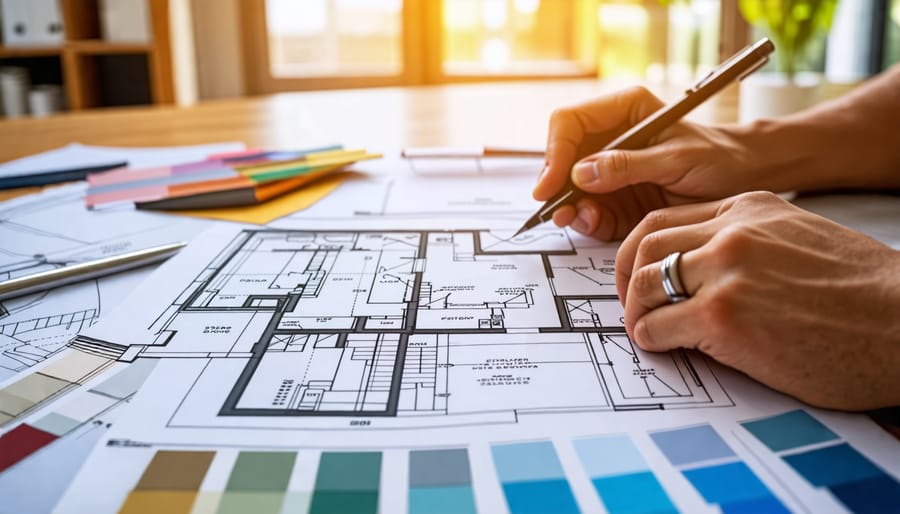
7 Essential Steps to Plan Your Dream Home Renovation
Set clear goals and priorities for your renovation to guide decision-making and keep the project focused. Create a detailed budget that accounts for materials, labor, contingencies, and key principles of design. Develop a comprehensive plan that includes timelines, resource allocation, and task sequencing to ensure a smooth, efficient process. Prepare your home and family for the renovation by decluttering, setting up temporary living spaces, and communicating expectations clearly with all involved parties.
Define Your Renovation Goals and Priorities
Before diving into the details of your renovation project, it’s essential to define your goals and priorities. Take some time to reflect on what you want to achieve with this renovation. Are you looking to update the aesthetics, improve functionality, or increase your home’s value? Be specific about your objectives, such as creating an open-concept living area, adding a home office, or modernizing your kitchen. Once you have a clear idea of your goals, prioritize them based on importance and feasibility. Consider your current and future needs, as well as those of your family. If you plan to stay in your home long-term, think about how your lifestyle may change over time and incorporate those considerations into your renovation plans. It’s also crucial to be realistic about your priorities. While it’s tempting to dream big, it’s important to focus on the most essential aspects of your renovation first. Make a list of your must-haves and nice-to-haves, and be prepared to make compromises if necessary. When setting your goals and priorities, involve all stakeholders in the decision-making process. If you share your home with a partner, family, or roommates, make sure everyone’s needs and preferences are heard and considered. This collaboration will help ensure that your renovation project meets the expectations of all those involved and minimizes potential conflicts down the road. By clearly defining your renovation goals and priorities upfront, you’ll create a solid foundation for the rest of your planning process. This clarity will guide your decision-making, help you communicate effectively with professionals, and ensure that your renovation project stays on track and aligns with your vision.

Set a Realistic Budget
Determine Financing Options
When it comes to financing your renovation, start by assessing your savings. Set aside a portion of your budget for unexpected expenses that may arise during the project. If your savings don’t cover the full cost, consider taking out a personal loan or home equity loan. Personal loans often have fixed interest rates and predictable monthly payments, making budgeting easier. Home equity loans allow you to borrow against the value of your home, often at lower interest rates than personal loans. Another option is a home equity line of credit (HELOC), which functions like a credit card, allowing you to borrow funds as needed. Be sure to compare interest rates, fees, and repayment terms before deciding on a financing method. If you have a good credit score, you may qualify for 0% APR credit card offers, which can provide interest-free financing for a limited time. Carefully weigh the pros and cons of each option to determine the best fit for your financial situation and renovation goals.
Get Detailed Cost Estimates
Getting itemized estimates from contractors is crucial when planning a renovation. Don’t settle for a single, lump-sum quote; request a detailed breakdown of all costs, including materials, labor, and any additional fees. This allows you to compare bids more accurately and identify areas where you might be able to save. It also helps prevent surprises down the line, as you’ll have a clear understanding of what’s included in the price. When reviewing estimates, look for specifics like the quality of materials, timeline for completion, and any warranties or guarantees. Don’t be afraid to ask questions and negotiate — a reputable contractor will be transparent and willing to work with you to create a plan that fits your budget. Remember, the more detailed the estimate, the better equipped you’ll be to make informed decisions about your renovation.

Create a Detailed Renovation Plan
Consider Functional Needs and Aesthetics
When planning your renovation, it’s crucial to strike a balance between functional needs and aesthetics. Consider how you want to use each space and what practical features are essential for your lifestyle. For example, if you love to cook, prioritize a well-equipped kitchen with ample storage and counter space. At the same time, think about the overall style and ambiance you want to create. Browse design magazines, websites, and social media for inspiration, and develop a clear vision for your desired aesthetic. Whether you prefer a sleek, modern look or a cozy, traditional feel, make sure your design choices align with your personal taste and the home’s architecture. Keep in mind that you’ll be living with these decisions for years to come, so choose finishes, colors, and materials that you’ll love for the long haul. By carefully considering both function and style, you can create a renovation plan that meets all your needs and exceeds your expectations.
Consult with Professionals
Consulting with professionals is a wise investment when planning a renovation. Architects can help translate your vision into detailed plans, ensuring the design is functional, aesthetically pleasing, and adheres to building codes. Interior designers are skilled at creating cohesive, stylish spaces that reflect your taste and meet your needs. They can guide you in selecting materials, colors, and finishes that tie everything together beautifully. Contractors are essential partners who bring expertise in construction methods, materials, and project management. They can provide valuable insights on costs, timelines, and feasibility. Involving these experts early in the planning process can save you time, money, and headaches down the road. They’ll help you navigate the complex world of renovations, making informed decisions and avoiding costly mistakes. Working with professionals ensures your renovation is well-planned, properly executed, and yields the beautiful, functional space you envision.
Research Building Permits and Regulations
Before starting any renovation project, it’s crucial to research local zoning laws and building permit requirements. Begin by contacting your city or county’s building department to inquire about necessary permits for your specific project. They can provide information on zoning regulations, building codes, and any special permits needed, such as electrical or plumbing work. Be prepared to submit detailed plans, including drawings and specifications, when applying for permits. The review process can take several weeks, so plan accordingly. Don’t forget to factor in permit costs when budgeting for your renovation. Failing to obtain proper permits can result in fines, project delays, and even legal issues. Plus, unpermitted work may cause problems when selling your property in the future. Stay compliant by thoroughly researching requirements and securing all necessary approvals before starting construction. If you’re unsure about navigating the permit process, consider hiring a professional contractor familiar with local regulations. They can guide you through the paperwork and ensure your renovation meets all legal standards. By doing your due diligence upfront, you’ll set your project up for success and avoid costly setbacks down the line.
Schedule the Renovation Realistically
When creating your renovation timeline, it’s essential to be realistic about how long each phase will take. Start by breaking down the project into smaller tasks and estimating the time needed for each one. Remember to factor in potential delays, such as weather issues, material shortages, or unexpected repairs. It’s a good idea to add a buffer of a few days or even weeks to your timeline to account for these unforeseen circumstances. Consider the order of tasks and which ones depend on others being completed first. For example, you can’t install new flooring until the subfloor is repaired and the room is empty. Be sure to schedule tasks in a logical progression to avoid delays and rework. If you’re working with contractors, discuss the timeline with them and get their input on how long each phase will realistically take. They can provide valuable insights based on their experience and help you create a more accurate schedule. Finally, be prepared to adjust your timeline as the project progresses. Despite your best planning efforts, unexpected issues can arise that require you to adapt. Stay flexible and communicate openly with your team to navigate any changes and keep the project moving forward.
Prepare for the Renovation Process
As you gear up for your renovation project, it’s crucial to prepare your home and your family for the upcoming changes. Start by decluttering and organizing the areas that will be renovated, as well as any adjacent spaces that may be affected by the construction. This will not only make the renovation process smoother but also protect your belongings from potential damage. If the renovation is extensive, consider making alternate living arrangements for the duration of the project. This could mean staying with family or friends, renting a temporary apartment, or even planning a well-timed vacation. Ensuring a comfortable and stress-free living situation during the renovation will help you maintain a positive outlook throughout the process. Open communication with your family members is key when preparing for the process. Discuss the renovation plans, timeline, and any potential disruptions to daily routines. Encourage everyone to voice their concerns and work together to find solutions. If you have children, involve them in the planning process by asking for their input on design choices for their rooms or common areas. This will help them feel excited about the upcoming changes and more invested in the final result. Finally, take the time to properly pack and store any items that need to be moved out of the renovation area. Label boxes clearly and consider renting a storage unit for larger items or those that won’t be needed during the renovation. By taking these preparatory steps, you’ll set yourself up for a more organized and efficient renovation experience.

